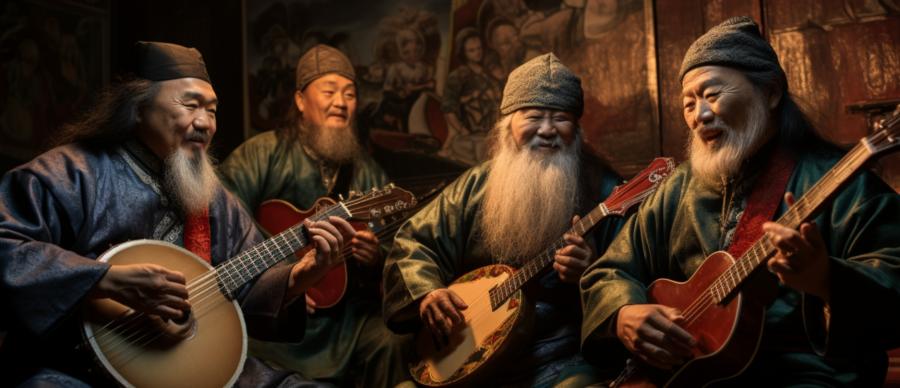Tuva Republic: Russia's Center of Asia with Throat Singing Legends

Traveling to the Geographic Center
Imagine yourself hurtling through the Siberian wilderness in a Russian minibus, the hard consonants of the Tuvan language bouncing around your eardrums like a pinball machine on overdrive. Your destination is Kyzyl, the capital of the Russian Republic of Tuva, and the exact geographic center of Asia. And why, you may ask, are you embarking on such an absurd adventure? To experience the legendary Tuvan throat singing, of course!As your minibus barrels towards the heart of Central Asia, you can't help but notice the stark beauty of the landscape, as the steppe grasslands of southern Siberia give way to the towering peaks of the Altai Mountains. Just remember to keep an eye out for the occasional herd of stampeding yaks, or you might find yourself careening off the road and into a ditch, like some doomed character in a Dostoevsky novel.
A Brief History of Tuvan Throat Singing
Before we delve into the intricacies of this peculiar art form, let's pause for a moment to consider the cultural history of Tuva. Tuvan throat singing, or "khoomei", is an ancient form of vocal music that has been practiced by the nomadic tribes of Central Asia for thousands of years. The Tuvan people developed this unique style of singing in order to communicate across vast distances, as the low, guttural tones produced by the vocalists are capable of carrying for miles across the open steppe.Unlike any other form of music on earth, Tuvan throat singing is characterized by the simultaneous production of two or more distinct notes, as the singer manipulates the shape of their mouth and throat to create complex harmonics and overtones. This results in an otherworldly sound that is at once mesmerizing and deeply unsettling, as if some ancient spirit had been awakened from its slumber to serenade the world with its mournful dirge.
Experiencing the Magic of Tuvan Throat Singing
Upon arriving in Kyzyl, you are immediately struck by the warm hospitality of the local Tuvan people, who greet you with open arms and a steaming cup of fermented mare's milk (which you gamely sip, while trying not to gag on the pungent aroma). As night falls, you make your way to the local performance hall, where a group of Tuvan throat singers is preparing to take the stage.As the lights dim, a hush falls over the audience, and the throat singers begin to perform. The effect is like nothing you've ever heard before, as the sounds of the Tuvan steppe come alive through the vocalists" incredible range and control. One moment, you're listening to the eerie wail of a lonely wolf, the next, the thunderous rumble of a distant waterfall. The experience is nothing short of transcendent, and you find yourself transported to another world, where the boundaries between man and nature have been blurred into oblivion.
After the performance, you have the opportunity to meet the throat singers and learn more about their unique art form. They demonstrate the various techniques used to create the different styles of Tuvan throat singing, including "kargyraa", which is characterized by deep, rumbling undertones, and "sygyt", which features high, ethereal harmonics reminiscent of the wind whistling through the mountains.
Exploring the Land of Tuva
With the echoes of Tuvan throat singing still ringing in your ears, you set out to explore the rugged beauty of this remote corner of the world. Here, the endless expanse of the steppe is broken only by the jagged peaks of the Altai Mountains, and the few scattered settlements that dot the landscape serve as a reminder of the nomadic way of life that has persisted for centuries.- Visit the Tuvan National Museum to learn more about the history of the region and its unique musical traditions.
- Trek to the sacred mountain of Khaiyrakan, which is believed to be the dwelling place of the spirits that protect the Tuvan people.
- Join a local family for a traditional Tuvan meal of buuz, a type of steamed dumpling filled with mutton, and wash it down with a glass of araga, a potent distilled spirit made from fermented milk.
Article kindly provided by myfavouritehols.com
Latest Articles
- How to Plan Around Peak Congestion Days for Mountain Trips
- Mapping Your First Mountain Resort Loop Without Losing Your Sanity
- How Pro Kitchen Renovations Quietly Increase Booking Confidence in Self-Catering Stays
- Discover a City's Real Character From the Backseat
- How to Make Airport Layovers Surprisingly Productive
- From HVAC to ROI: the Hidden Economics of Sustainable Hotel Design
- How to Plan Your Day Tours to Minimize Crowds and Maximize Serendipity
- From Tourist to Observer: How to Photograph a City Like a Local
- Seasonal Shifts in Abandoned Turkish Valleys Reveal Clues About Heritage Site Decay
- Mastering Group Travel Planning for Events in Fort Lauderdale
- Beyond the Beach Bus: Hidden Palm Beach Spots Worth the Group Ride
- Chrono-Travel and Time Zone Acrobatics on a Coach
- Hidden Miami Charter Bus Routes to Secret Beaches, Local Food Gems, and Underrated Attractions
- More Than Just Ice - Unexpected Events at Amerant Bank Arena
- Madrid's Strangest Museums and Attractions You Never Knew Existed
- Disaster-Proof Rentals: A Flood-Resilient Guide for Holiday Homeowners
- Following the Footsteps of Filmmakers: Morocco's Iconic Movie Locations You Can Visit
- Hidden Gems Along Morocco's Coastline
- Tastes of Miami: Culinary Tours for the Global Foodie
- Milwaukee's Hidden Green Gems: Nature's Best Kept Secrets

